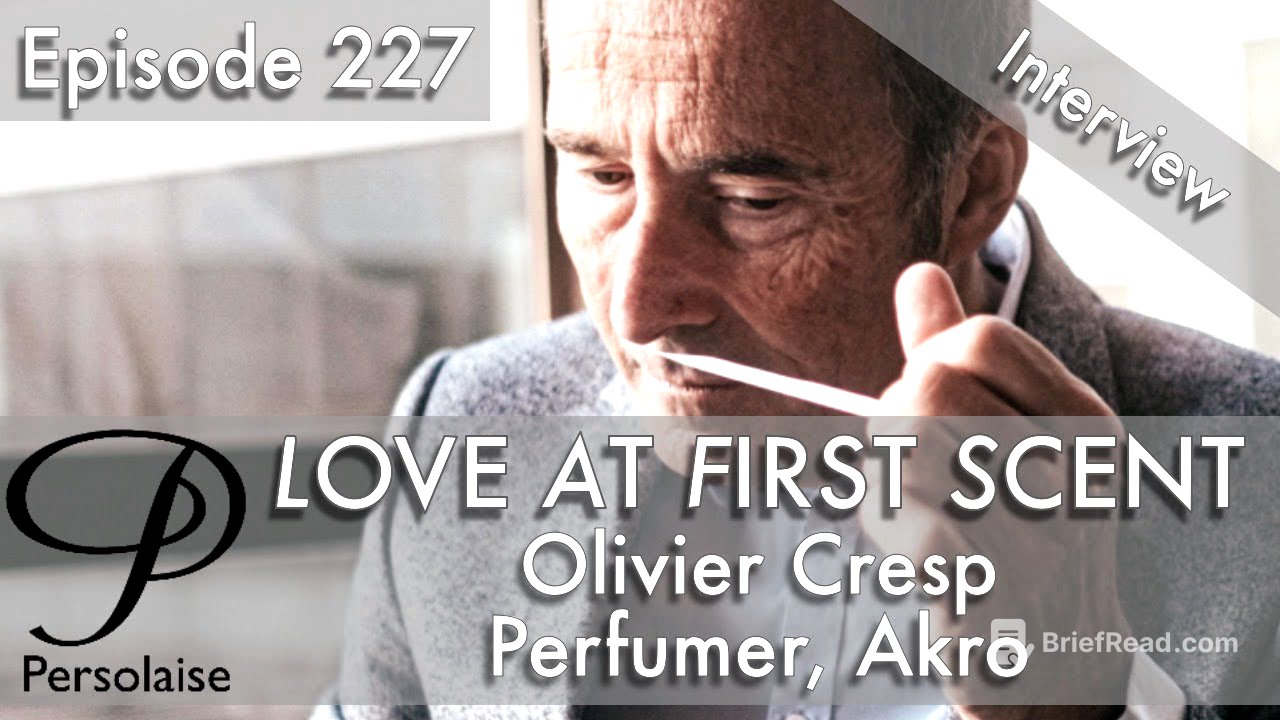TLDR;
Olivier Cresp, the perfumer behind iconic fragrances like Mugler's Angel and Dolce & Gabbana's Light Blue, discusses his career, the creation of Acro fragrances with his daughter Anais and her husband Jack, and his approach to perfumery. He shares insights into the creative process, the importance of balancing artistic vision with wearability, and the challenges of reformulation. Cresp also touches on the evolution of the fragrance industry, the role of collaboration, and the need for brands to focus on creating lasting pillars rather than endless flankers.
- Cresp reflects on the enduring impact of Angel and its unique place in perfumery.
- He details the collaborative process behind Acro, guided by his daughter's vision and quality standards.
- Cresp emphasizes the importance of clarity, wearability, and storytelling in fragrance creation.
- He shares anecdotes and insights into specific fragrances like Haze, Night, Smoke, and Kenzo Jungle.
- Cresp advocates for a more focused approach to fragrance launches, emphasizing quality over quantity.
Introduction [0:01]
The host introduces Olivier Cresp, highlighting his impressive portfolio of famous fragrances, including the entire Acro collection, Penhaligon's Juniper Sling, Dolce & Gabbana's Light Blue, and Mugler's Angel. Cresp's extensive background in perfumery, with family roots in Grasse, makes him a distinguished guest to discuss his life and career.
The Enduring Legacy of Angel [2:11]
Cresp shares an anecdote about encountering someone wearing Angel at the airport, highlighting the fragrance's lasting impact and how it's now enjoyed by a wider age range than initially anticipated. He expresses pride and amusement at the continued success and relevance of Angel, noting its unique profile and global appeal.
The Genesis of Acro: Addictions and Vices [5:01]
Cresp recounts the origins of Acro, a brand he created with his daughter Anais and her husband Jack. The concept emerged from Anais's idea to focus on addictions and vices, translating figurative ideas into fragrances. Despite initial challenges in finding a suitable name, they settled on "Acro," a shortened version of "accro," meaning addicted in French. Cresp emphasizes that Acro fragrances are legal and designed to bring pleasure and enjoyment.
The Creative Process Behind Acro [8:50]
Cresp describes his daughter Anais as the "task master" during the creation of Acro, pushing him to achieve the same level of quality as Angel. He shares his initial stress and eventual satisfaction with Haze, a cannabis-inspired fragrance that quickly became a hero product. Cresp notes the similarities between the concept of Acro and the addictive, figurative nature of Angel.
Crafting Wearable Addictions: Haze as an Example [12:58]
Cresp explains his approach to creating wearable fragrances, using Haze as an example. He blends ingredients like wormwood, eucalyptus buds, and spicata mint to mimic the scent of cannabis, while ensuring the fragrance remains appealing and wearable for both men and women. Cresp emphasizes the importance of balancing creative vision with a style that allows people to enjoy and receive compliments while wearing the fragrance.
The Allure of Night: A Clean Rose Turned Naughty [17:50]
Cresp discusses Night, a fragrance that transitions from a clean, aldehydic rose to something animalic and sensual with notes of cumin and agarwood. He shares an anecdote about Night being particularly well-received by women and highlights the importance of adapting the fragrance's description to different cultural contexts, emphasizing romance and the power of love in regions like the Middle East.
Smoke: A Tobacco Tale Inspired by Family [21:00]
Cresp shares the story behind Smoke, a tobacco fragrance inspired by his children, who are smokers. He aimed to capture the essence of Amsterdam tobacco without the honey note, which he dislikes. His son's suggestion to incorporate a smoky element led to the addition of birch and cade, enhancing the fragrance's depth and complexity. Cresp emphasizes his use of numerous ingredients to tell a story, similar to a writer crafting a book.
Knowing When a Fragrance is Finished [26:14]
Cresp addresses the challenge of knowing when a fragrance is complete, describing it as a "never-ending story." He explains that time constraints and the need to prepare for launches force a stop to experimentation. Cresp shares that while continuous improvement is tempting, there comes a point where confidence and positive feedback indicate that the fragrance is ready. He also teases the upcoming seventh Acro fragrance, hinting that it may be the best one yet.
Collaboration and the Evolution of Perfumery [29:03]
Cresp reflects on his collaborative relationships with other perfumers, particularly Jacques Cavallier and Alberto Morillas. He notes the increasing trend of multiple perfumers working together on projects, driven by the desire for diverse perspectives and expertise in specific markets. Cresp also observes that the younger generation of perfumers is intelligent, passionate, and well-trained, often working effectively in collaborative settings.
Kenzo Jungle: Bringing the Forest to the City [33:36]
Cresp recounts the creation of Kenzo Jungle, a fragrance inspired by the brief of bringing the forest into the city. He combined cedarwood, spices like cinnamon and cardamom, and fresh notes of orange blossom to create a woody, spicy, and fresh scent. Cresp emphasizes the importance of simplicity in fragrance creation, noting that things should be done easily and without overcomplication.
The Art of Remembering and Reformulation [36:43]
Cresp discusses his ability to recall the materials and formulas of perfumes he created long ago. He acknowledges the challenge of recognizing the vast number of fragrances on the market today compared to the past. Cresp also addresses the topic of reformulation, explaining that while it's often the original perfumer who handles it, the key is to maintain the fragrance's essence while adapting to ingredient restrictions.
The Most Misunderstood Acro Fragrance and the Importance of Education [40:35]
Cresp identifies Night as the most misunderstood fragrance in the Acro collection, noting that its unique combination of rose and cumin can be polarizing. He emphasizes the importance of educating consumers and boutiques about the fragrance's concept and nuances. Cresp also reflects on past fragrances, such as Gloria by Cacharel, and the factors beyond the scent itself that contribute to a fragrance's success or failure.
The Creation of Angel: A Moment of Knowing [42:44]
Cresp shares that he knew Angel would be groundbreaking during its creation, recounting anecdotes of people being captivated by the scent even in its experimental stages. He emphasizes the importance of receiving compliments and positive feedback as a sign of a fragrance's potential.
A Vision for the Fragrance Industry's Future [45:36]
In response to a final question, Cresp suggests that the fragrance industry should launch fewer fragrances and focus on creating lasting pillars rather than endless flankers and limited editions. He advocates for taking more risks and returning to a time when there were fewer, more impactful launches, allowing for greater focus and quality.









